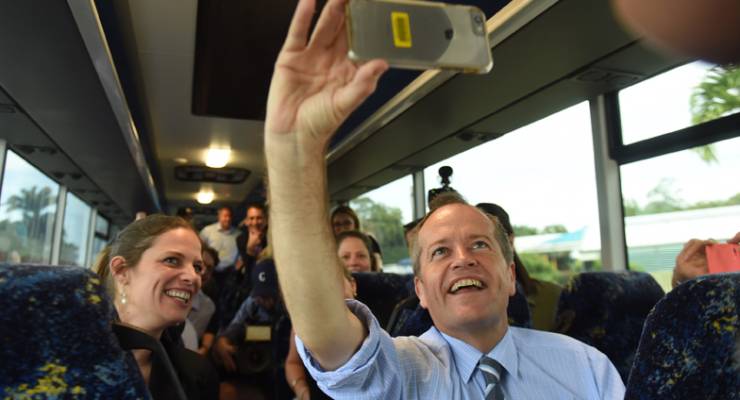
The first week of an election campaign is when the parties’ strategies are at their purest, untarnished by collisions with reality, polling and focus group reactions to their messages in the atmosphere of an election campaign. Thus Malcolm Turnbull is endlessly repeating that he has a national economic plan for growth and jobs, while Bill Shorten is focusing on health and education. Turnbull, at least, brings a charming meta quality to his rhetoric, as if he’s winking at us — “I know I’m saying all the lines that a campaigning politician must say,” you can sense him wanting us to think, “but please focus on the enthusiasm with which I’m playing this role, not the lines themselves.” Shorten, however, is always in character; the only meta around him are the clunky metaphors he occasionally produces.
Shorten has concentrated nearly all his energies so far on far north Queensland, basing himself in Townsville for three nights to target Herbert and Dawson; this morning he flew south to Rockhampton today to campaign in Capricornia, another Queensland marginal Labor is hoping to wrest off the LNP. If there’s a first-mover advantage to be gained in north Queensland, Labor will get it, particularly with Shorten’s disgraceful pork-barrelling — an offer of $100 million for a local footy stadium, which today yielded this political gold.
Turnbull, on the other hand, has been hitting and running — Brisbane, Sydney, now Melbourne, focusing on capitals and major TV markets, getting more exposure than Shorten. If you have a bad day, that strategy can go badly awry, as it did yesterday when his trip to Penrith was curtailed after that disastrous media conference with Lindsay MP Fiona Scott; the TV coverage in Sydney that night was awful, with the perception Turnbull had fled from western Sydney (worse yet, for a Marie Claire interview!).
The government continues to be dogged by the superannuation retrospectivity issue, even though it had a small win today when Tony Abbott signalled his backing (quite a change from his “seniors tax” position). This surely was not something it planned for — government strategists couldn’t be blamed for assuming their super tax changes in the budget were safe from Labor attack, given they were intended to neutralise a successful Labor campaign on the issue. Now, instead, they’ve created a new problem within the party base itself.
Worse was Turnbull turning up in the Mossack Fonseca papers. Twenty years ago, of course, a long time before he entered politics — but of course that cut no ice with the Coalition when they were calling Julia Gillard a crook and pursuing her over AWU matters from the early 1990s. This won’t be a one-off — there’ll be a steady drip of stories about different companies Turnbull’s name is linked to showing up in the documents, none of which will show any wrongdoing of any kind, but which will detract from Turnbull’s clear air for promoting his “national economic plan”. As with the superannuation changes, the very complexity of the issue is a problem for Turnbull — voters only hear his name and “Panama Papers”, and link them. The best political messages are the ones that confirm voters’ prejudices or stereotypes, and linking Turnbull to the Panama Papers plays exactly to Labor’s stereotype of Turnbull as a rich, out-of-touch banker.
Not that Labor is without its troubles: the party branch that gave us senator Joe Bullock selected a Maritime Union of Australia official to replace Melissa Parke in Fremantle who has now been dumped because of criminal convictions back in the 1980s. Labor’s links with the union movement are rich soil for the Coalition to till: for every high-quality former union leader like Ed Husic, there are duds like Joe Bullock (to say nothing of Craig Thomson). Eight weeks will be a long time in the electoral spotlight for every candidate, especially those with something they wouldn’t like to see on a front page.








Turnbull has solid support derived from Labor;s numerous past blunders, while poor Shorten has to appease the many nutters in his camp.
Shorten must be relieved he has so many astute allies such as Crikey among the capitalist media.
Norm you’re dribbling again
Two things, I don’ interpret Turnbull’s meta quality as winking but more as smirking and looking like a cardboard cutout.
Secondly, what IS this ‘economic plan’?
Turnbull’s “…charming meta quality to his rhetoric, as if he’s winking at us…” is, in fact the hand of the Liberal Right, which is so far up his bum his eyes are watering.
I wonder if Cash trimmed her nails?
We lost the Smirk soon after the 2007 cleansing but now we have the Smarm – looking like the canary that swallowed the cat then drowned in their own vapidity.